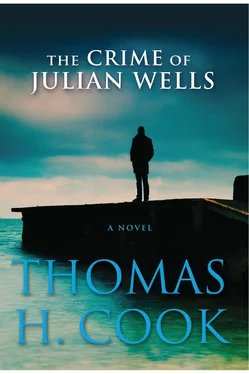Thomas Cook - The Crime of Julian Wells
Здесь есть возможность читать онлайн «Thomas Cook - The Crime of Julian Wells» весь текст электронной книги совершенно бесплатно (целиком полную версию без сокращений). В некоторых случаях можно слушать аудио, скачать через торрент в формате fb2 и присутствует краткое содержание. Год выпуска: 2012, ISBN: 2012, Издательство: Grove Press, Жанр: Криминальный детектив, на английском языке. Описание произведения, (предисловие) а так же отзывы посетителей доступны на портале библиотеки ЛибКат.
- Название:The Crime of Julian Wells
- Автор:
- Издательство:Grove Press
- Жанр:
- Год:2012
- ISBN:9780802194589
- Рейтинг книги:5 / 5. Голосов: 1
-
Избранное:Добавить в избранное
- Отзывы:
-
Ваша оценка:
- 100
- 1
- 2
- 3
- 4
- 5
The Crime of Julian Wells: краткое содержание, описание и аннотация
Предлагаем к чтению аннотацию, описание, краткое содержание или предисловие (зависит от того, что написал сам автор книги «The Crime of Julian Wells»). Если вы не нашли необходимую информацию о книге — напишите в комментариях, мы постараемся отыскать её.
The Crime of Julian Wells — читать онлайн бесплатно полную книгу (весь текст) целиком
Ниже представлен текст книги, разбитый по страницам. Система сохранения места последней прочитанной страницы, позволяет с удобством читать онлайн бесплатно книгу «The Crime of Julian Wells», без необходимости каждый раз заново искать на чём Вы остановились. Поставьте закладку, и сможете в любой момент перейти на страницу, на которой закончили чтение.
Интервал:
Закладка:
But I had not.
Now, however, with that scene playing in my mind, the question rose again as to whether Julian had been right in thinking that Father Rodrigo was going to be arrested. Therefore, when I got back to Paris, I decided to see if I could answer it.
12
I dialed the number almost immediately after returning to my hotel in Paris, then waited the usual protracted amount of time it took my father to answer, longer this time than when I’d called him on my first night in Paris.
But at last he appeared on my computer screen, already dressed for bed, though it was late afternoon in New York.
“I can see you very clearly,” I told him.
He smiled. “You, too. It’s really quite amazing.”
We talked about trivial matters for a time, the weather in New York and Paris, a smattering of world and national news, then on to my impression of Rene and our visit to Oradour-sur-Glane.
At last I said, “Do you remember that when Julian and I were in Buenos Aires we met an old priest named Father Rodrigo?”
“Of course,” my father answered. “You said he’d heard of me. I was surprised by that.”
“Do you have any idea whatever happened to him?”
“Only that when Julian went down to the Chaco, he was no longer there,” my father answered. “But I’m sure Julian told you that.”
“Another of the disappeared,” I said.
“So Julian thought,” my father answered.
“He spoke to you about it?”
“Yes,” my father answered. “Evidently this priest had said some fairly dangerous things when they met. Julian told me what he’d said, but I didn’t see it as all that dangerous. It was common knowledge, after all, that we were more or less in cahoots with the junta.”
“But what else could explain the fact that Rodrigo went missing?” I asked.
“Well, sometimes people vanish of their own accord,” my father told me. “In a place like Argentina at that time, there were many reasons a man might want to make himself scarce.”
“What would have made Father Rodrigo leave Argentina?” I asked.
“Nothing, if he was what he seemed,” my father said.
“A country priest, you mean?”
My father nodded. “Even one with a loose tongue.”
“You’re saying Father Rodrigo might have been more than that?” I asked.
“I’m saying it’s possible that in Argentina at that time such a priest might have been used.”
“By whom?”
“The Montoneros, of course,” my father answered. “Lots of priests were working for the Montoneros.”
He saw that I had no idea what he was talking about.
“They were pretty much finished by the time you went to Argentina,” he explained. “But before the junta, they murdered anyone who opposed them. And if Rodrigo were a Montonero, and he got wind that he had been discovered or was about to be discovered, then he might have found it a very good idea to leave the country.”
“How could he have escaped?” I asked. “He was a poor parish priest.”
“Yes, but if he were a Montonero, they could have financed his departure from Argentina,” my father told me.
“What money would the Montoneros have had?”
“They would have had the millions they got from kidnappings and bank robberies,” my father answered. “One kidnapping alone brought in sixty million dollars. It was the largest ransom ever paid. It’s in the Guinness Book of Records .”
“Would Julian have known any of this?” I asked.
“I doubt it,” my father answered. “Why do you ask?”
“Because he seemed to think that Rodrigo was going to be arrested,” I answered. “He told this to Marisol.”
My father suddenly grew very still. “I didn’t know that,” he said quietly, and for a moment looked like a man sitting in a darkened theater, awaiting a film whose story he dreaded.
“He never mentioned it?” I asked. “Not even after he got back from Argentina?”
My father shook his head. “Of course, we rarely talked after that.”
This was true. Julian had but rarely seen my father after Argentina, and even then only at what were more or less public gatherings, Loretta’s wedding, for example, and Colin’s funeral.
“Good people like this Father Rodrigo can be manipulated, Philip,” my father said quietly, like a man considering the treacheries of life.
“But Julian couldn’t have known that Rodrigo might be a Montonero operative,” I said.
“That’s true,” my father said firmly. “The only way he could have had intelligence of that sort was if he had some contact at Casa Rosada.”
“Which, of course, he didn’t,” I said.
“No, of course not,” my father said. “They were absolute evil.” His eyes appeared to see that evil quite clearly. “They tortured people mercilessly.”
I saw that his mood was blackening, so I moved to change the subject.
“You know, it’s interesting to think that Rodrigo might still be alive,” I said, almost lightly. “And if the Montoneros wanted to get him out of Argentina, he could be anywhere.”
Now my mind fixed on the shadowy priest with whom Julian had often been seen at Le Chapeau Noir. “Anywhere at all,” I said, almost to myself.
“Anywhere at all,” my father repeated. The darkness fell upon him again. “It’s a twisted world, Philip,” he said, “the one you’re touching now.”
“At the end of the conversation, my father said that I was getting into a twisted world,” I told Loretta when I called her later that night.
She had listened silently, and when I finished, she took a moment before she spoke.
“Do you think that priest might actually have been a Montonero?” she asked.
“I don’t know,” I said, though I immediately began to consider the possibility. Certainly it was possible that Rodrigo might have gotten carried away with some form of revolutionary theology, agreed to help the Montoneros in some way, and then, with the junta on his trail, found it necessary to flee the country.
I shared this with Loretta, then added as if I half believed it, “He might even be in Paris. Maybe even at this little bar Julian frequented. Rene said that Julian often talked with a priest there.”
I said this jokingly, as if describing the elements of a potboiler plot, but Loretta’s tone turned serious.
“Your father’s right,” she said. “It is a twisted world.” A pause, then, “Be careful, Philip.”
Some warnings come like the tolling of a bell, and thus it was with Loretta’s.
For that reason, if for no other, I should have heeded what she said to me and thus anticipated the terrors that awaited. But the Saturn Turn twists for all, as Julian had already learned, and so I moved unknowingly ahead.
Part III
13
In The Terror, Julian’s curious meditation on one of Gilles de Rais’s awful minions, he wrote:
The route to moral horror is never direct. There are always ramps and stairs, corridors and tunnels, the secret chamber forever concealed from those who would be appalled by what they found there.
We all had secret chambers, I thought, though most chambers probably harbored nothing more fearful than some peculiar desire, or if not that, then perhaps simply the sad awareness of an inexplicable inadequacy we dared not reveal. Even so, Julian would have been the last I’d have suspected of having such a place. At his father’s death, he had been deeply stricken, but he had rallied even from this loss, regained his footing, and proceeded on, his confidence returning with each passing day, so that within a month or so, he seemed once again the boy of old, though perhaps even more determined to make a mark in the world.
Читать дальшеИнтервал:
Закладка:
Похожие книги на «The Crime of Julian Wells»
Представляем Вашему вниманию похожие книги на «The Crime of Julian Wells» списком для выбора. Мы отобрали схожую по названию и смыслу литературу в надежде предоставить читателям больше вариантов отыскать новые, интересные, ещё непрочитанные произведения.
Обсуждение, отзывы о книге «The Crime of Julian Wells» и просто собственные мнения читателей. Оставьте ваши комментарии, напишите, что Вы думаете о произведении, его смысле или главных героях. Укажите что конкретно понравилось, а что нет, и почему Вы так считаете.












